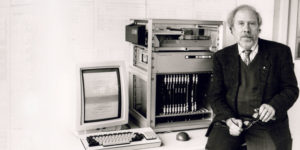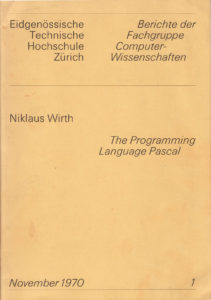The Pascal Programming Language

Niklaus Wirth, designer of Pascal as a programming language, and also Module-2 and Oberon. He is also one of the pioneers in Software Engineering.
Introduced in 1970 by Niclaus Wirth, Pascal was designed to force the implementation of well structured, clear programs and reduce the number of errors during development. These characteristics soon made him the benchmark for teaching programming at the University.
Pascal is a strongly typed language, with code divided into fragments with their own semantics (functions or procedures) and with variables that must be declared as a step prior to their use, preventing the interpretation or conversion of values, as for example C.
These characteristics today common were pioneers at the time of Pascal‘s presentation, and made a language thought exclusively as a didactic resource penetrate the market as a general-purpose language and used in a multitude of applications in different settings, from the field of research to the game development. Pascal was the language used for the Apple Lisa and the early Macintosh.
The first versions of Pascal translated the source code into code for a virtual machine (P-machine), which allowed to run software on different architectures only by re-implementing the P-machine. This idea is revised years later by other languages.
The evolution of Pascal took him from the possibility of creating windows in a non-graphical environment (MS-DOS) to object-oriented programming with Delphi, designed for the development of visual applications in a Windows environment. Today (2021) Free Pascal is the reference system for programming in Pascal, the Lazarus environment, a clone of Delphi, has versions for Windows, OS X and Linux.
Pascal
Born: 1970
Evolution: Turbo Pascal (1983); Object Pascal (1985); Delphi (1995);
Influences of: ALGOL W; Simula 67;
Influences: Ada; Go; Java; Modula-2;

